Charli XCX: The Anatomy Of A (3-D) Female Pop Star
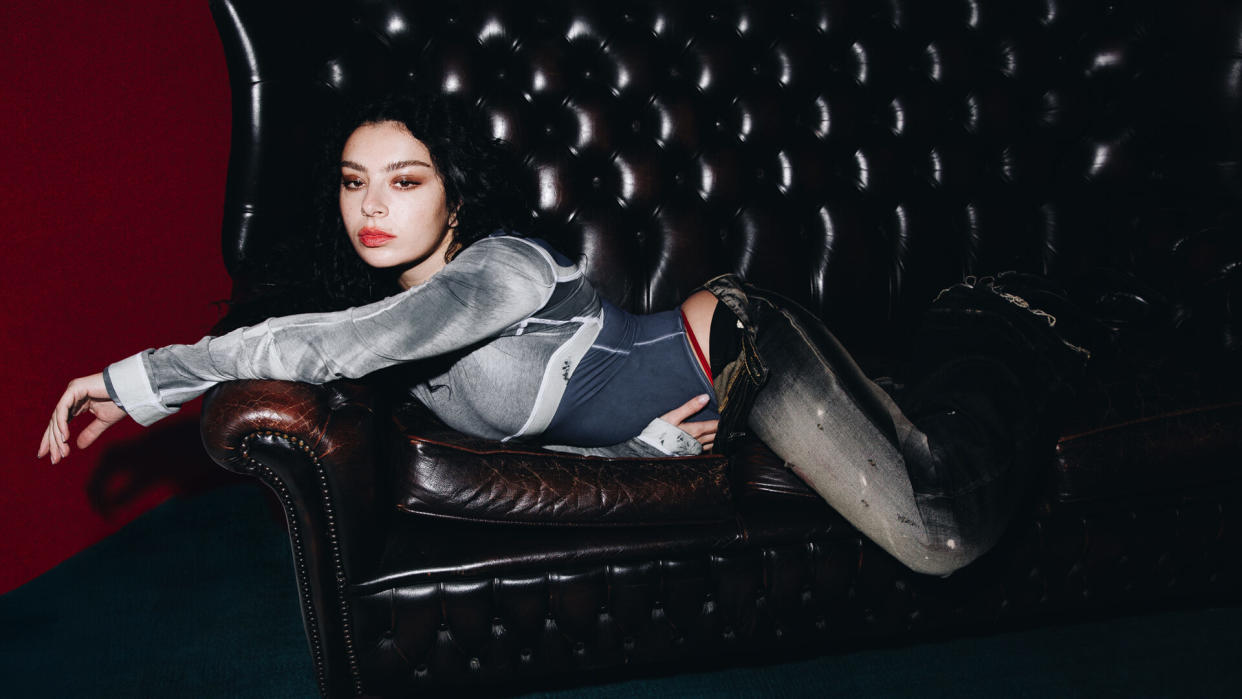
It was while creating a hedonistic, indulgent club album that Charli XCX started to think about what it would be like to have a baby. The 31-year-old has always been an artist of extremes, a main character thriving on an emotional and creative knife edge. But the timing wasn’t about craving novelty, on this occasion. She’s now in her thirties and in a happy relationship of equals with The 1975’s George Daniel.
An alternative reality, one in which she would be the supporting character, was presented to her when she went to Stockholm to visit her songwriting collaborator Noonie Bao, her first close friend to have a child. “It was crazy seeing her standing in the same clothes she’s always worn, but now she has this completely different perspective on life than I do. She’s not enforcing that on me; it’s just a fact. She’s not alive for the same reasons that I am now,” reflects Charli. It seemed like Bao understood some mysterious truth, accessible only through motherhood. It made Charli wonder if she’ll ever be privy to that secret. Maybe she’ll say, “Fuck it, I don’t want to conform to centuries of indoctrination.” If she does fold and become a mother, will she be fine with it — or will she crave the freedom she once had?
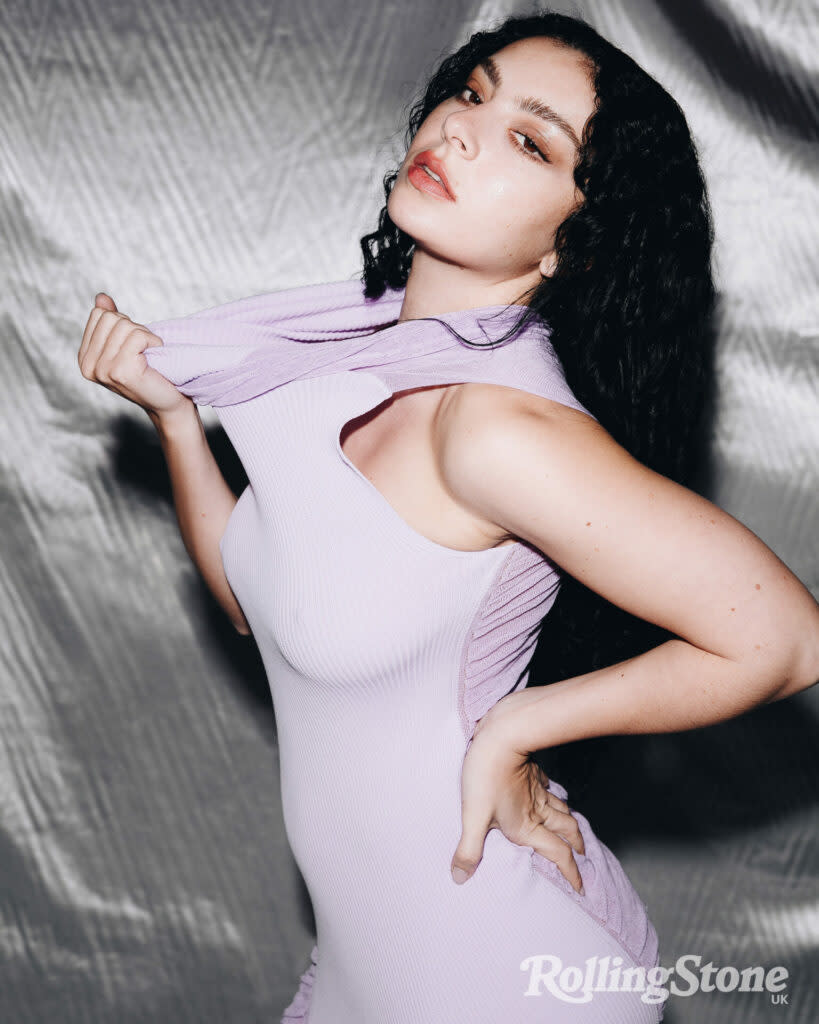
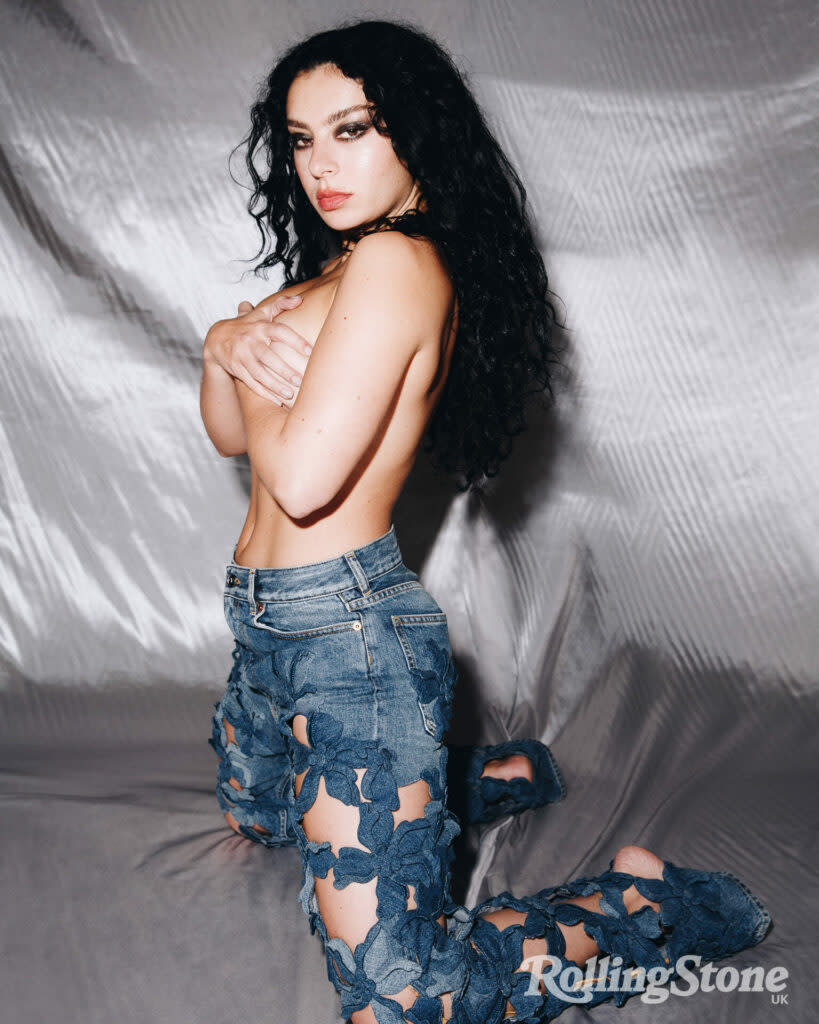
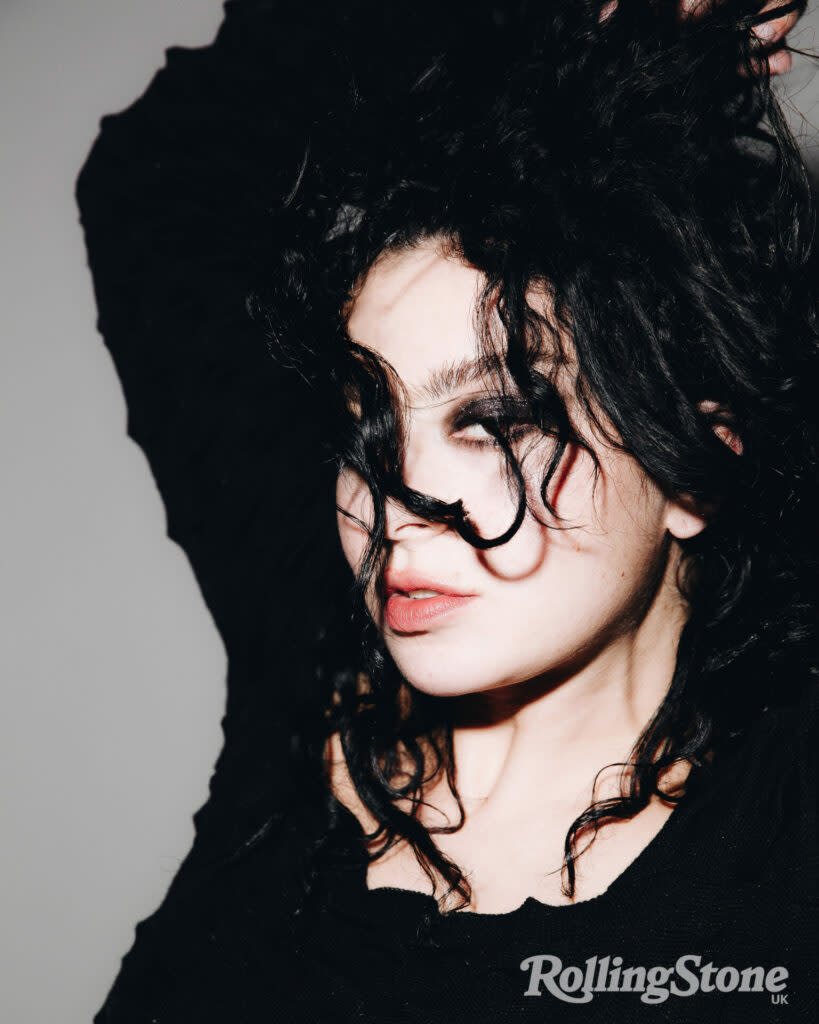
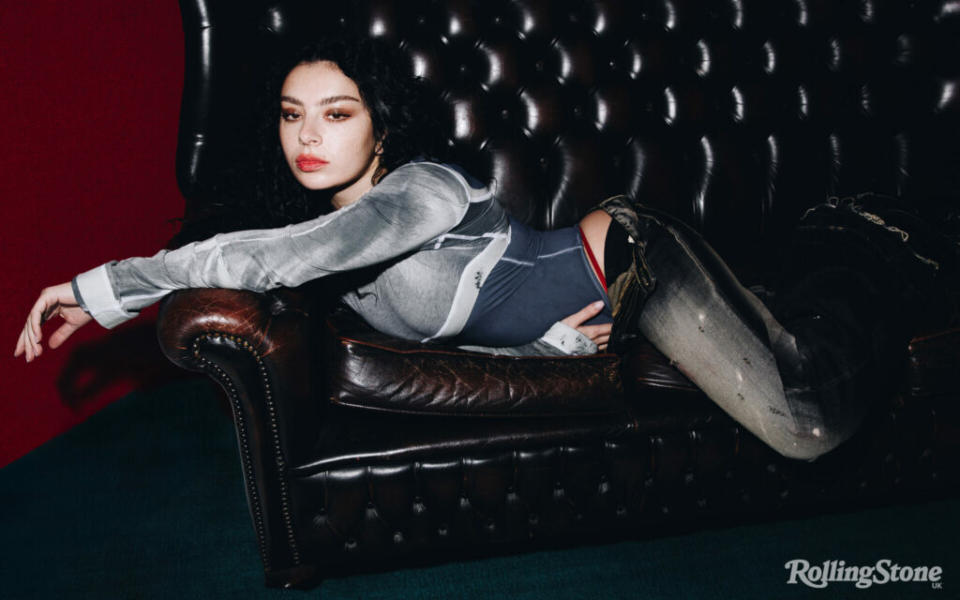
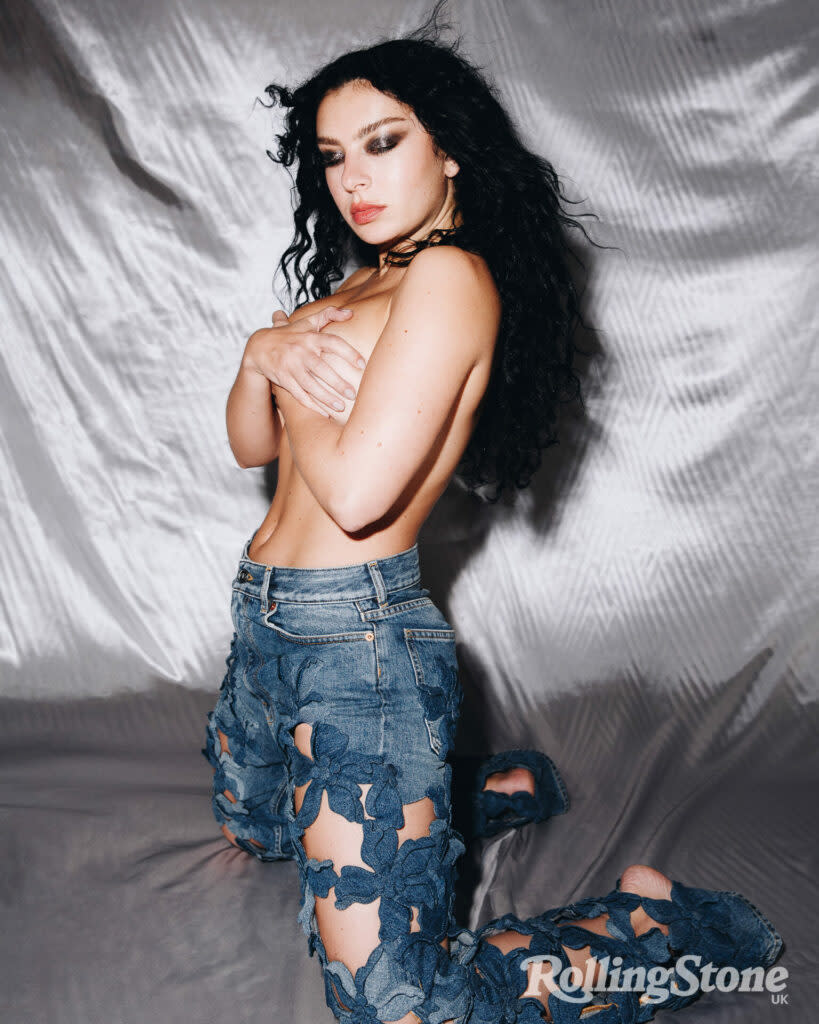
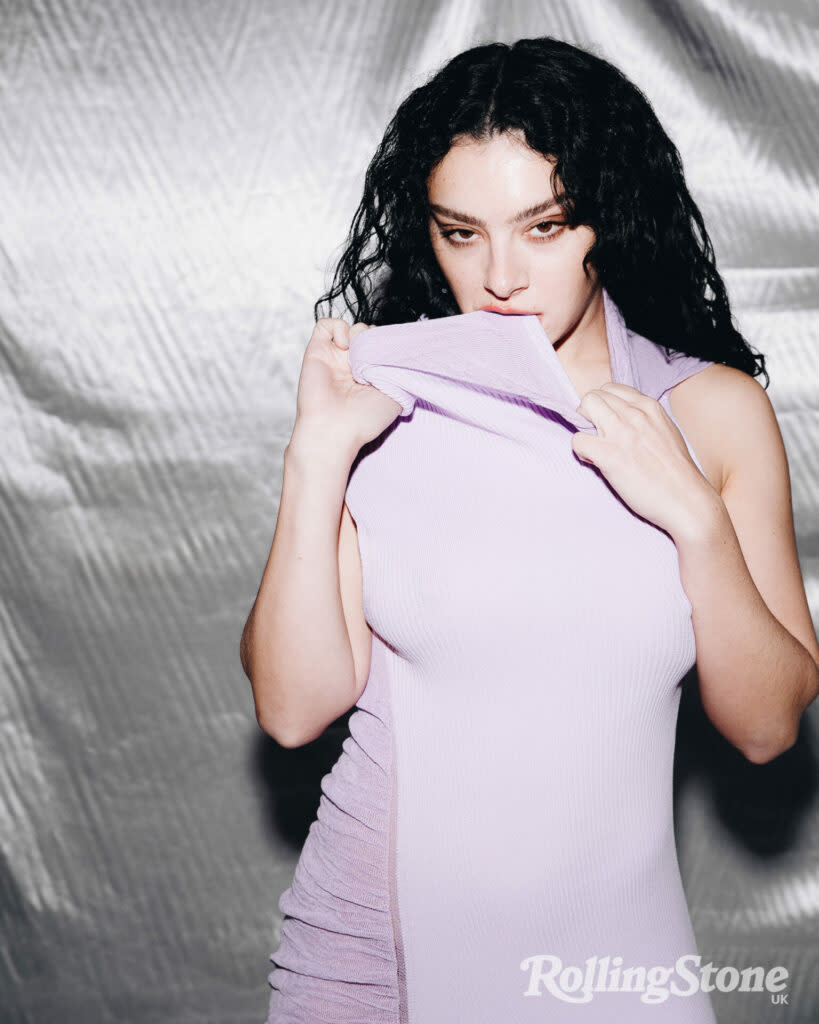
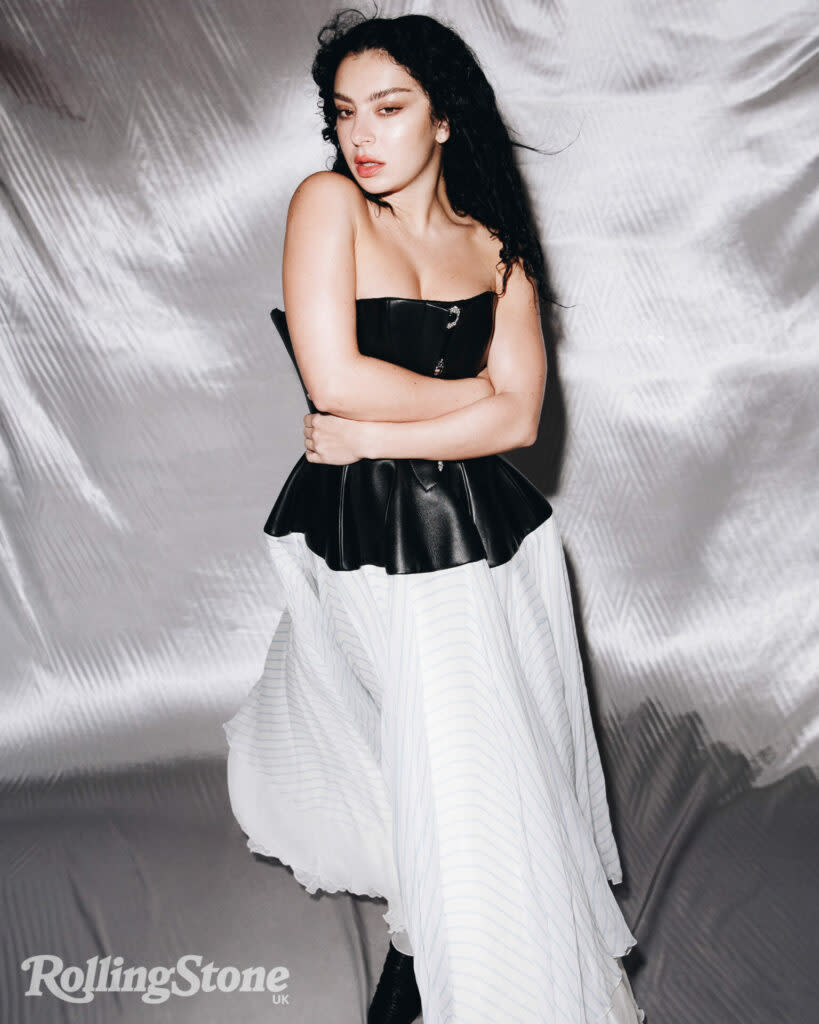
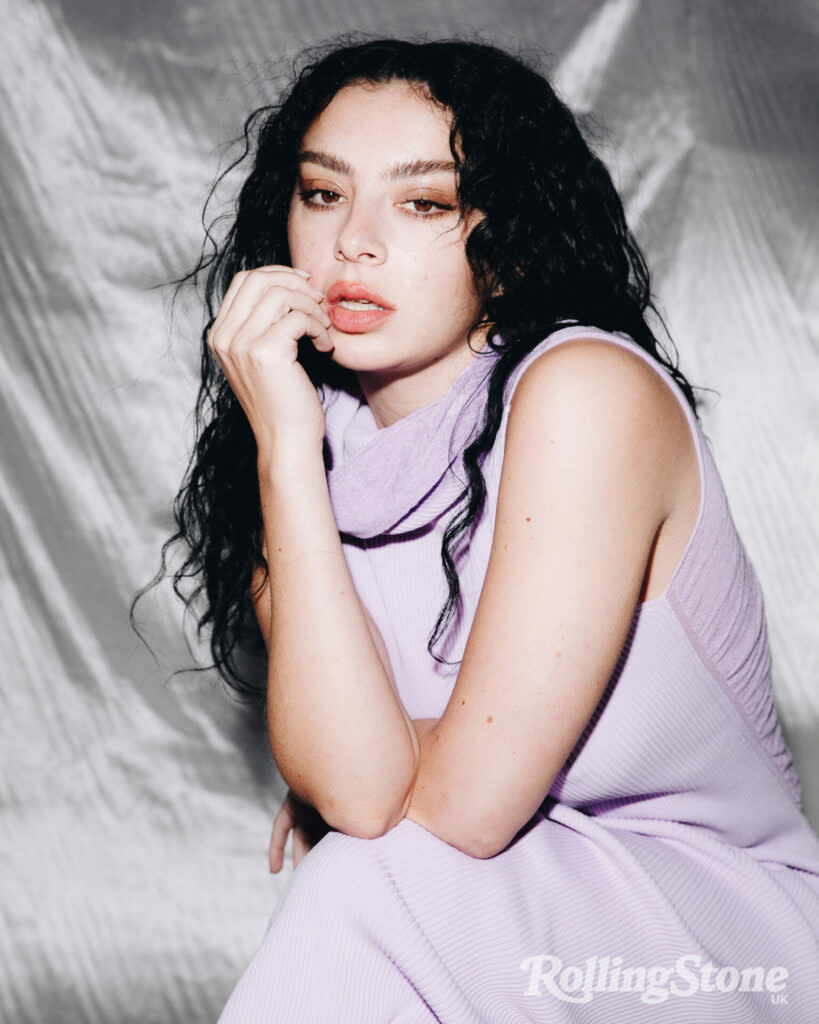
The questions have circulated in her mind: “Am I less of a woman if I don’t have a kid? Will I feel like I’ve missed out on my purpose in life? I know we’re not supposed to say that, but it’s this biological and social programming. There’s a lot of pressure on women to not talk about that stuff super openly, especially not in pop music or in music generally; we’re supposed to be sexy and free and fun and wild.” But her new album, brat, already possessed those qualities, so she made the penultimate track about her feelings on possible motherhood: the sonically sparse soliloquy, ‘I think about it all the time’.
For any woman who slides around on the scale of ambivalence about children, the question of whether to have them or not becomes increasingly shrill with every passing birthday or acquaintance’s pregnancy announcement on Instagram. If you’re as high-powered as a pop star whose last album went to number one in the UK, as well as having a hit — ‘Speed Drive’ — on the original Barbie soundtrack, the most ubiquitous movie phenomenon of the decade, a certain answer would require extra planning and sign-off. “My circumstance involves me making a decision and being like, ‘I’m gonna come off my birth control. I’m not gonna tour. I’m going to see what George wants to do, and then we’re gonna try for a baby,’” she says, and adds, after searching for what she wants to say, “I feel like a kid; I don’t feel like I can make that decision.”
And yet the time will come when she will choose, one way or the other. “You have to make the decision — because we have a clock,” she says, with a snort in place of the exasperating phrase “as a woman”.
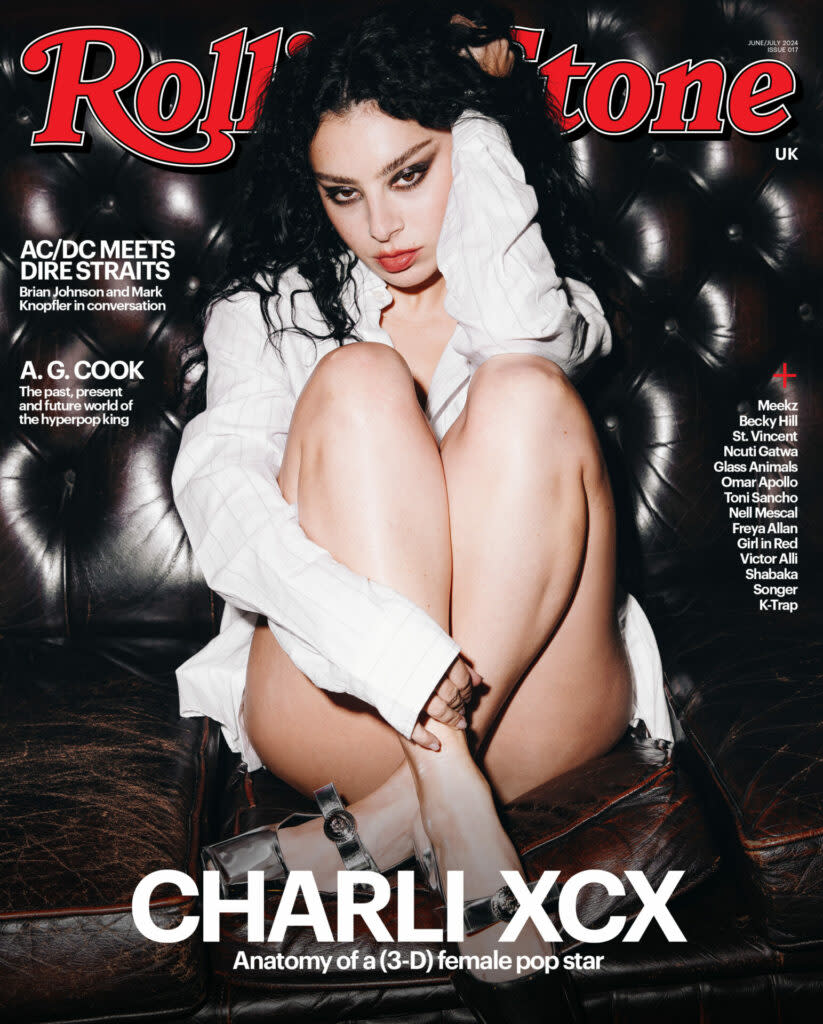
When Charli XCX arrived for this interview, striding through her own back door wearing sunglasses, it was approaching night-time. I’d been waiting for her to return from freestyling her way through a label talk for YouTube. Every room in her home is decorated like a Tim Walker photoshoot: chandeliers hang from euphorically high ceilings, coffee-table books and animal-print flourishes are casually positioned, and an artist’s easel complete with stick portrait is set up in a corner. The auspicious Hollywood Hills house must have been blessed by the party gods; she purchased it in 2020 from legendary DJ Calvin Harris (who bought it from its previous owner, the Swedish House Mafia DJ, Steve Angello).
Immediately after the property changed hands, so did the narrative around her. For the first decade of Charli’s career, her avant-pop was subversive and overshadowed by her mainstream pop contributions on Iggy Azalea’s ‘Fancy’ and Icona Pop’s ‘I Love It’. But post-pandemic, she metamorphosed from that game-changing artist on the fringes, never quite paid her dues, to the figurehead of a whole sub-genre (hyperpop) and one of the most directly influential sounds in pop. Since Charli doesn’t have long to spend with me because she has important plans tonight, she leads the way in a grey suit and hot pink heels straight upstairs to a darkened studio room with candles that appear to have been left burning all day.
Within minutes, she blasts a selection of Y2K EDM-inspired tracks from brat, then stops to lean back in her chair delighted, smoke a cigarette and swig a red Coke, like only a woman who thinks she’s king of the world would. “This is my best record, for sure! For sure!” she says. Give it another song’s time, and she is explaining the meaning behind excoriatingly personal Auto-Tuned ballad ‘I might say something stupid’, about the existential fear she gets as someone who is “famous but not quite” the morning after an industry party.
“It’s about: ‘What have I fucking said? Did I belong in that situation? Did I amplify elements of my personality because I felt that I couldn’t be myself? Who even am I?’” she says offhandedly. “Especially when around monolithic artists, I sometimes feel insecure about my position. I think a lot of artists feel that, but we don’t talk about it because we’re all supposed to be strong and confident.”
Emotional architecture aside, first and foremost, brat is a club record. At this point in early February, fans have not yet heard the conceited rager about her own celebrity, ‘Von dutch’, her Vroom Vroom EP counterpart ‘Club classics’ or the hypnotic bounce of ‘B2b’ (which she tells me is about someone she briefly dated who was a serial pop-star dater). Sonically, the album is deceptively simple: a few sounds per track build confident spaces that foreground her lyrics. References for this “no clutter” production were her late friend and collaborator SOPHIE’s work, and songs like Peaches’ ‘Fuck the Pain Away’. The album’s circularity and returning sounds make it feel pleasingly like a DJ mix with no beginning and no end.

“Club electronic music is what makes me feel most alive. My nightmare is going to see a pop show or, like, a band,” Charli says in her Valley girl British accent forged in the cultural fires of being Essex-raised but having spent a decade living in LA. “Which is funny, obviously, because: George. You can put that in; he knows how I feel about it.” The music that makes others feel emotional only leaves her cold. Electronic dance music, though: “It’s sadness and beauty and stillness — it does something to me almost chemically, I think.”
Charli worked on a few tracks with Daniel, who she first paired up with musically in 2021 for a collaborative single ‘Spinning’ with No Rome. Recently, they’ve been buried away in the room we’re in, working on remixes for her upcoming Boiler Room set, the most RSVP’d Boiler Room in history. “We want to impress each other, and we think we’re both really good, but I’m actually such a bitch in the studio with George,” she laughs. “Because we’re obviously so close, you lose everything in terms of the normal studio boundaries.” Sometimes that can mean telling her fiancé, a slower-paced perfectionist who typically creates in a band dynamic, to hurry the fuck up. Her hyper-spontaneity has melded successfully with his sure-footed technical abilities. “We flow really well, and he leaves a lot of space for people to breathe and be them and do their process.”
All the crafted metaphors on the radio-friendly pop of concept album Crash (2022) are gone, just as those replaced the diaristic real-time frustrations, hopes and dreams of her pandemic album, how i’m feeling now (2020). “For me, the pendulum has to swing so drastically for me to feel inspired,” she says to explain brat, but it applies to her whole ethos. brat’s lyrics are like deep meaningful conversations over voice notes: “I really do feel like I’m saying things that I would say in private to friends.” She compares this intimate approach to the Pop Writing 101 on Crash single, ‘Good Ones’. “You would never actually say, ‘Me? I let the good ones go!’” she says, swivelled around in her computer chair, slapping her hands down on her legs in jest. “We’d probably be like, ‘Oh my God, I’m a fucking mess. I keep falling for fucking idiot guys.’”
Her work to date has often been about relationships, infidelity and fucking idiot guys. Besides ‘B2b’, one unnamed song that’s explicitly about her current relationship, and talismanic lyrical mentions of “George” to cement his presence into her life and career, brat is about women. It’s about her relationship to women in her life, her feelings about SOPHIE, competitiveness with female artists and her primary relationship with a woman: the connection she has with herself. Its topics feel sharp, reflective and specific, like ‘Sympathy is a knife’, which explores how she craves for moments of insecurity to be witnessed, only to feel embarrassed when sympathy is extended. In clumsier or more commercial hands, some of these themes could be corny or delivered in therapy speak, I offer. She couldn’t agree more: “I think people really believe it when I say something.”
When it’s time to leave her house, I ask her what she’s doing tonight. I imagine she has another keynote speech or a booking to play a billionaire’s birthday party. Her face drops. She cringes and says, “I’m getting a facial… I know, I know.” I laugh, and she gives a sly grin, avoiding eye contact. “She’s just… really good, and I didn’t want to cancel it… I’m sorry.”
It’s the kind of answer you want from someone who calls herself a “cult classic” and had just told me she’s not that into “this” part of her job, gesturing between us. After the release of her most accessible pop album and being part of Barbie, it would have been a slick and obvious transition for her to become an edgy Dua Lipa for middle America. Instead, she’s chosen the path most interesting to her. If Charli XCX doesn’t think she’s being clever, she’d be bored, and if she could no longer deem herself aggressively cool, she’d have long since retired.
That contradictory cocktail of brashness and ambition and insecurity and vulnerability are central to what makes her such an enduringly — and perhaps, to some, off-puttingly — three-dimensional pop star.
A couple of weeks later, nearly 40,000 East Coast gays were struck down with a case of FOMO. Meanwhile, the 500 New York club kids and LGBTQ+ elite who had won the RSVP lottery, were gathered in a small warehouse for Charli’s Boiler Room set. Or, as DJ Ty Bushwick tweeted, the “Bushwick Met gala”.
A remix of Endor’s ‘Pump It Up’ plays while Drag Race’s mohawked Aquaria stalks around. Two fans in Von Dutch hats headbang at the barrier. Seemingly everyone is vaping indoors and either dressed like a gothier Spike from Buffy or undressed like a back-up dancer in a Britney music video. We’re all here to witness and embody for ourselves the outer layer of the Charli XCX psychological onion: the alpha rock star, the living composite of every 2000s celebrity DUI photo, the woman who kick-started this album cycle by telling us we’re all obsessed with her.
Fittingly, once Charli, her long-time producer A. G. Cook, and George Daniel get behind the decks, the first noise we hear is Charli hitting the sampler to play herself saying “me”. Wearing a big blue T-shirt emblazoned with the words “club classics” in all caps, she mixes a couple of hits, unreleased music and Benny Benassi’s ‘Satisfaction’. While she mixes ‘Vroom Vroom’, she plays the word “George” on the sampler, looks over her shoulder and catches his eye. They both grin at each other. Later, he gets enthusiastically introduced as “my sexy fucking fiancé”.
In the middle of the event, Charli calls the actress, artist and all-round It Girl Julia Fox out from the VIP pit, who proceeds to the platform to sing her debut single, ‘Down the Drain’. Fox was on her way to the Boiler Room when Charli asked if she wanted to perform. “I was just so blown away that she would even share such a monumental moment with me. It really goes to show what a girl’s girl she is and how she does want to elevate everyone around her,” Fox tells me. Their friendship had been developing for a while prior to this, which Fox attributes to how empowering it feels to be around Charli. “She has a calming energy where you feel like you’re gonna be OK around her because she’s such a boss.”

During one of the set’s highlights, Charli takes her boots off, gets up on the platform in tights and sunglasses and dances to A. G. Cook’s mix of Rihanna’s ‘Bitch Better Have My Money’. If anyone else did this, it would be a moment of madness, a high-camp breakdown, but executed by someone who has the body of Venus de Milo with better muscle tone and the confidence of a pack of lions, it provides the sort of communal high you wait a whole night out to experience.
If you looked closely enough, though, at the beginning of the night her hands were shaking as she manoeuvred the knobs and sliders. While she quickly warmed up, it initially seemed as though she was handling it without much enjoyment. “Me and George in particular were so fucking nervous,” she tells me later, noting that both of their DJ employment histories are mainly messy parties. “I actually was looking back at some of the footage when we were doing the edit, and I literally look terrified, which doesn’t really happen for me when I do live shows, but I haven’t DJ’d with eight cameras in front of my face before.”
When she was in her early teens, Charli DJ’d at illegal raves in London, accompanied by her parents because she was so young. Later in the mid-2000s, during the Pop 2 era, A. G. Cook had a studio in Seven Sisters attached to a club. They’d take their freshly made music inside to play to people for immediate live feedback —to her, the Boiler Room set provided a similar thrill. “I love hearing my own music at parties. For me, the best setting is listening to it out and very loud because you’re not supposed to hear it in a Starbucks, and you probably never will — unless there’s a twink who’s the manager.”
In the same way that dogs resemble their owners, an artist’s fan base says a lot about the artist. Outside in the relentless queue of the Boiler Room after party, the best-dressed glamazons of New York wait in the rain without umbrellas for an hour and a half before being let in. One of Charli’s Angels — the name bestowed on her complex, funny and highly opinionated fanbase — gives a long scream, and another starts to cry elegantly. “This is not giving protect the dolls,” a trans woman says, buffing her perfect bob. Another hot Angel tries to push through, saying, “I’m Addison Rae”. When Addison Rae arrives in an SUV (and is immediately approached by a gay guy who says, “Addison Rae, I love your work”), the Angel cocks her head and changes tack: “I’m the mom from Spy Kids.” Despite dramatic threats to kill themselves, no one has left, and the second people get inside, their faces turn to stone, as though the downpour never happened. “How do I look?” one fan asks another. “Cunty,” they reply.
A true powerhouse — someone with force of will, energy and influence — will turn up to an event and change the energy in the room. At the 2024 Billboard Women in Music awards, Charli is on the red carpet explaining that she’s about to perform a sensitive new song that might make her cry. A bubbly female interviewer says, “What safer place to do something like that than in a room of women!” and Charli’s body masks an internal sigh before replying dryly, “Right, totally, yes. Girl power, I suppose.” The two interviewers laugh, completely missing her sarcasm.

After she settles herself on the stage to perform, she admits that her heart is beating fast. The song she’s chosen is ‘So I’, a heavily Auto-Tuned balladic celebration of SOPHIE, who died in 2021 in a tragic accident. It’s laced with Charli’s lament at lacking the maturity or self-security to embrace the closeness that the late producer was extending (“Your words, brutal, loving, truthful / I was petrified”). Given that the night was about celebrating female artists, Charli tells me, “It felt really right to honour SOPHIE in that space as an incredible trans artist but also an incredible visionary person, period.”
When she collects her Powerhouse award, she seems emotionally off-kilter. Instead of telling the female audience about how legendary the women in the room are tonight and the degree to which women rule the entertainment industry, she talks about the “headfuck” of being a woman and a woman in music. Addressing them, she says that women can be jealous, and measure and pit themselves against each other. They want to be hotter or more successful or more something, like another woman.
Charli’s friend, the actor and comedian Jordan Firstman — who also lives in LA, which he calls “the land of opportunistic fucking assholes and Charli just isn’t one of them” — cites her honesty as the quality that still surprises him in their relationship. “I find it so, so refreshing in a friend when they can be real about their insecurities,” he says. “If she’s feeling bad about where she’s at or jealous of someone, she is not afraid to say it, where so many people put up this front that they have never felt insecure or jealous a day of their life, they’re just in their own lane. No one actually feels that way.”
While she appreciated how special it was to perform ‘So I’, Charli had to speak her mind at the event. “I can’t with the lack of reality in situations like that because we’re all smart. Women don’t have to play the lowest common denominator morally safe card to continue to be smart and liked — you can be honest.” The truth, she believes, is that jealousy and insecurity are present even, and perhaps especially, at events like that. “Being jealous is somehow wrongly equated to not supporting women or not being a girl’s girl, which isn’t true. You can, I think, experience envy and still be a good person who champions other women,” she says, adding, “Jealousy is just not a very sexy feeling, or a sexy characteristic really, is it?”
To Charli, jealousy is simply about survival of the fittest, and that animalistic urge to thrive is necessary in an industry that values newness, women’s youth and palatability. “If you were just chill and happy, you probably wouldn’t be working in this industry at the level that I am, you know? There’s a competitive nature to this industry, and I think you have to choose how to harness it, or not.”
It’s that attitude that has typically shown her uplevel in some way on every album or project. When Firstman met Charli at one of his “naughty but not immoral” pandemic house parties, he told her, “Charli, you’re the Rick Rubin of your generation — the way you spot other talent and work with every single influential person and bring the vision to life. But I don’t know if you’re a pop star, girl, sorry.” According to Firstman, Charli nodded along politely (naturally, he was bedridden with Charli-level fear the morning after). Watching her perform on the Crash tour, with her new dancing abilities and first-ever embrace of pop choreography, he realised she could go as far as she wants to: “That willpower can do anything.”
If she had to name a female artist she has been most jealous of, fans would be amused to hear that it’s Lorde. There’s a longstanding joke within the standom where fans call Charli Lorde or ask her to play ‘Royals’ at shows. This began after an interviewer mistook her for Lorde and told her one of her favourite songs was ‘Royals’. (In the moment, of course, Charli played along and pretended she was the singer.)
“When ‘Royals’ came out, I was super jealous of the success that that song got, and that Ella got. You piece all this stuff together in your brain, like: ‘She was into my music. She had big hair; I had big hair. She wore black lipstick; I once wore black lipstick.’ You create these parallels and think, ‘Well, that could have been me.’ But it couldn’t have because we’re completely different people. I wasn’t making music that sounded anything like ‘Royals’. I think you just read what you want into it because you’re feeling insecure about your own work.” The envy didn’t last forever, and Charli flags that her and Lorde are on good terms. “You get over it and then you try to figure out all the things that are unique about you and you pursue that, and then probably in five months’ time you have a breakdown about something else,” she says. Ultimately, she adds, it is deep until it’s not that deep.

In anticipation of the reviews for Crash, the night before the album dropped, Charli was photographed heading out for dinner at Mayfair’s Sexy Fish in a Praying crop top that said, “They don’t build statues of critics”. Any indifference she might feel towards culture journalists aside, she herself is a critic who happens to work as a pop star. She thinks about being a musician through an almost academic lens and then refines her theories by way of her experiences from within the celebrity machine.
“To have a truly good album campaign that doesn’t crumble when you scratch the surface, you have to be interested in theory,” she says. That could mean staging a video shot by the public in which she’s “caught” driving in LA listening to her own music (‘Von dutch’). Or scaling a jumbo jet for its music video. Or posting a TikTok of friends like Firstman and comedian Rachel Sennott reading iconic viral marketing ideas her label “sent” her.
Charli has arrived at some of that theory by analysing how alternative subculture and edgy youth culture operate online. “I wouldn’t say I’m deeply invested in edgelord culture, but have I scanned the texts? Sure,” she says flatly. She’s less interested in the politics of notorious Dimes Square podcast Red Scare, for example, but enjoyed an episode that applied highbrow thinking to the lore and music of Lana Del Rey. “Obviously, it depends what kind of artist you are, but I think memorable albums are rooted in deep thought rather than just vibes, which to me is the biggest crime.”
When I speak to Charli over a video call in April, she’s barefaced in a black hoodie for a lowkey morning. Her only other plans for the day are scanning her sweaty body for the ‘Sweat’ posters for her joint tour with Troye Sivan and meditating using the Charli XCX method (signing 5,000 of her own CDs). She’s been too busy crafting the brat campaign to further consider the kids question, but some of her creative female friends have heard ‘I think about it all the time’ and related to it. “It’s really difficult to know what kind of mother I would be, to be honest. But I would hope that if I had a child, I wouldn’t approach looking after my child the way I approach my career,” she laughs.
Since we last met, someone online tweeted a collection of female pop stars’ minimalist new album covers that included brat’s artwork and accused art directors of being on strike. Charli tweeted in response: “i think the constant demand for access to women’s bodies and faces in our album artwork is misogynistic and boring” [sic]. “I struggle with the fact that art is taken at such face value in this day and age,” she says of this and the abundance of stan comments online that accuse the brat artwork of being lazy or under-delivering. “More often than not, people will just digest the thing that’s in front of them and not ask questions. That makes me quite depressed because part of the fun of pop music and especially pop campaigns is figuring it all out.”
The brat artwork in all its low-res, four-letter word anti-glory, is, of course, intentionally bratty. “I’m not trying to give you something pretty, I’m trying to make you think,” she says, speeding through her response. “I’m trying to make you look at yourself and wonder why it bothers you so much that my face isn’t on the cover? What does that say about pop culture that that is so bothersome to you? What does that say about what you expect from your artists? What does that say about me as an artist? Does it make me stupid to do that? Does it make me brave to do that? Does it make me lazy to do that?
“There are so many conversations that my album cover opens up, and in my opinion they’re more interesting conversations than, ‘Oh my God, look how hot she looks,’” she says, fatigued. “It’s a fine art conversation really.”
The album title is about more than just calling herself a brat, though she certainly is doing that. brat embodies the speed with which life on the internet is now lived through its unhesitating trend cycles and forms of gossipy, short-hand communication. Simultaneously, it’s a commentary on it. Its meta quality has meant that ‘Von dutch’, with its lyric “Do that little dance, without it, you’d be nameless,” unironically became a favourite soundtrack for TikTok influencers and users’ bratty little dances.
This online world is the hyperactive throwaway space in which Charli has observed that brats are thriving. “It’s about this sort of behaviour that everybody adopts on the internet, whether you’re a Twitter troll or whether you’re dancing to Addison Rae on TikTok. There is this element of unabashed, shameless, Me-centric content that is being made, but I also think behind that is a lot of people who use that as a protective layer,” she explains. “Brattiness is a cloak. You’re only a brat if you’re acting out against something that’s made you feel a little bit insecure.”
It takes a brat to know a brat, and it’s this theory that explains the unsettling and galvanising energy that’s always underpinned the Charli XCX project. Everything that goes into her sexy, dissociative persona only makes her feel more like a fully formed human, more like us. If only everyone understood her centralising rule about pop music: that its stars should be responsible enough to put more than just “cool vibes” out into the world. “That’s bad artistry to me,” she says, and adds with a sense of finality, “I just don’t think about my music or my artistry in a two-dimensional way — and I never will.”
Photography by Tyrell Hampton
Creative and styling by Joseph Kocharian
Hair by Jillian Halouska at The Wall Group
Makeup by Lauren Reynolds at Bryant Artists
Fashion Assistant: Aaron Pandher
Taken from the June/July issue of Rolling Stone UK – you can buy it here now.

 Yahoo News
Yahoo News 
